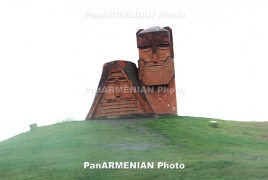
The early April military hostilities in Nagorno Karabakh and the acute threat of a graver escalation have focused the much-needed political attention of key international actors and produced an opportunity to find a peaceful solution to a generation-old conflict, the International Crisis Group said in a report.
In combat that included use of multiple-launch missile systems, heavy artillery, tanks, attack drones and highly trained special forces, Azerbaijan seized small land, and up to 200 people on both sides were killed.
“It is essential that the parties, urged on by France, Russia and the U.S., as co-chairs of the Minsk Group (MG) of the Organization for Security and Cooperation in Europe (OSCE), the diplomatic point body, make a decisive push for progress in peace talks,” the Crisis Group said.
“Resumed military escalation would likely be far more destructive than the April flare-up. In the wake of the April fighting, the publics in Armenia and Azerbaijan are more ready for military solutions than at any time in 25 years. Russia sees itself as the regional arbiter which is bound to intervene, not least because of its tight treaty relations with Armenia. Besides mutual affinity based partly on ethnic kinship, Turkey has military cooperation, a critical energy partnership and close political and economic relations with Azerbaijan.”
The talks the Armenian and Azerbaijani presidents agreed to on 16 May to pave the way for negotiations on a comprehensive settlement can be a chance to get a peace process back on track, the report says. However, it adds, the statement issued after the follow-on talks in St. Petersburg on 20 June suggest momentum might already be weakening.
“All the Minsk Group co-chairs should engage in the mediation effort at a senior political level in order to lend it the necessary weight and sense of urgency. For progress toward an eventual comprehensive settlement to be possible, there must also be parallel movement on confidence and security building measures (CSBMs), the OSCE investigative mechanism agreed in Vienna to establish responsibility for ceasefire violations. The co-chairs should maintain pressure on the sides to offer concessions. They should also engage Turkey, to encourage it to use its leverage in support of the peace process,” the report says.
“The EU should continue to give its strong political support to the Minsk Group, including through its bilateral relations with Baku and Yerevan.”
Finally, the Crisis Group says, the OSCE High Level Planning Group should step up preparatory work on a future peacekeeping force.
Concluding the summary of the report, the Int’l Crisis Group notes that none of this would yet mean achievement of a final resolution of the conflict.
But if there are concessions, the Group says, a genuine possibility that the peace process could break out of its current impasse and move forward in a positive direction could take shape.

